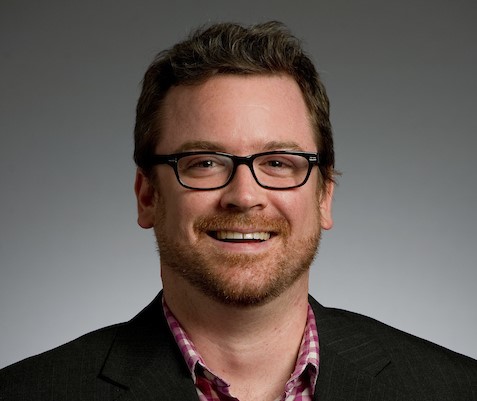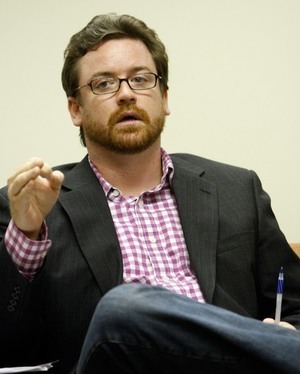

Eck Institute for Global Health faculty member, Terence McDonnell, Associate Professor in the Department of Sociology and Concurrent Associate Professor in the Keough School of Global Affairs, shares details about his global health research from a social science lens and what he finds to be the most gratifying moment while training students.
Q. Tell us a little bit about your research program. How and when did you first become interested in the field?
AIDS campaigns, effectively engender those changes. I began my career researching HIV/AIDS social movements. I examined the effects of protest tactics by ACT UP (AIDS Coalition to Unleash Power) in New York, from their Silence=Death/Pink Triangle poster to their street theater “die-ins.” After a trip to Accra, Ghana, I became interested in how public health organizations designed campaigns to improve HIV prevention and reduce stigma. Around the same time I worked on a Gates Foundation funded HIV and community study in Nigeria, cementing my interests in Global Health.
Q. What are you currently working on, and what do you hope to accomplish with it?
A. I’m currently working on two projects related to Global health. The first examines the process of design and fit of limb prostheses for amputees in Ghana. Ghana’s health system lacks the infrastructure to manage chronic diseases like diabetes, given the investments made in the health sector to fight infectious diseases like malaria and HIV. I’m interested in the examining creativity of designers and amputees in responding to these conditions of limited resources.
I’m also starting a project on what I call “empathy objects”—objects designed to engender empathy in people in order to effect change. For instance, do cuffs engineered to shake your hand uncontrollably like a person with Parkinson’s give doctors and caregivers more empathy for their patients? I hope to learn about these new technologies and whether they improve health care.
A. My greatest achievement to date is my book Best Laid Plans: Cultural Entropy and the Unraveling of AIDS Media Campaigns. The AIDS campaign designers I worked with in Ghana do the painstaking work of crafting clear, resonant, and culturally sensitive messages to motivate people to use condoms and abstain from pre-martial sex. I found these evidence-based media campaigns are undermined by unpredictable interpretations and misuses, as when I found female condoms turned into bangle bracelets, or when peer-educators moved campaign posters into their homes as decoration. In a situation of uncertainty, where AIDS campaign designers don’t really know what works, they rely on best practices. The book argues that the best practices of evidence based design and stakeholder “buy-in” in fact limit health organizations’ flexibility in shaping the meaning of campaigns on the ground. I’m honored to say this book won the Eliot Freidson Outstanding Publication Award for Medical Sociology, and earned best book honorable mentions from the Sociology of Development, and Communication, Information Technologies, and Media Sociology sections of the American Sociological Association.
Q. What do you find to be the most rewarding aspect of training students?
A. I really love mentoring students through senior theses—especially in the areas of global health. The moment when students arrive at an important research puzzle they are excited about investigating is really gratifying. But for me, the most rewarding moment is when they’ve come back from a research trip to Uganda or Ghana having proven—to themselves, more so than me—that they can do the work. After working closely with students, helping them design their projects and develop their methods skills, to see them exuding confidence in their work and accomplishments is truly winning.
Q. Tell us a fun fact about yourself, or something you enjoy doing in your free time.
A. Fun fact: Went to high school nationals for gymnastics in the pommel horse event. Presently I’m on a curling team here at Notre Dame. I love to cook, though I love eating food even more. I’m a cultural maven, so I’m always looking for book, board game, music, film, tv, theatre, and art recommendations. My wife (Erin Metz McDonnell, also a sociologist) and I try to travel overseas as often as possible to explore different food and cultures. I have two charming and lovable kids, Liam and Mara, who keep me busy with their various exploits and shenanigans.
Originally published by at globalhealth.nd.edu on April 30, 2019.